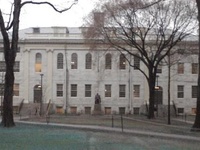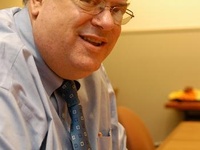“It has been a much more controlled process, and that’s a problem,” he says. “I would have loved to see more leakage—more of the ideas coming out and being put up there so people could discuss them,” he says. “If we knew someone on the committee they might tell us, but otherwise we wouldn’t hear about it. Committees would come to the faculty but they gave very general statements.”
Mendelsohn says he fears that waiting too long to involve faculty may weaken the review.
“Part of the difficulty is if you come into the procedure too late, you have to overcome a barrier before you can get into the discussion,” he says. “Once a committee has come up with a series of recommendations, there’s not an awful lot of room left for people who want to look at that differently. You can either vote something down, but that’s costly all around or you shrug and you say ‘isn’t that too bad.’”
WAITING PATIENTLY
Wolcowitz says that the review has remained quiet because the discussions have been so purposefully inconclusive.
“We’ve been trying to keep the working groups focused, to think about ideas and not have the community respond to half baked ideas that haven’t been fully formed,” he says.
And not all faculty are disturbed by their lack of participation, with many waiting to join the open discussion that Wolcowitz has promised will dominate next academic year.
Professor of Psychology David M. Wegner says he has no complaints about the review’s tight-lipped policy.
“I think that all of us have been consulted, but it’s more of a matter of how much of our own time we want to commit,” he says. “I’m aware of what’s been going on.”
Although no one has come to his office to ask him what he thinks, Wegner says, he has been satisfied with the level of consultation.
And while Dean of the Humanities Maria M. Tatar argues that having more details would make discussion easier, she says she does not feel uninformed about the review.
“I think there’s a general sense that we’re eager to get the committee’s reports, which I gather are provisional,” she says. “We’re moving into the more exciting phase of curricular planning.”
STUDENTS WEIGH IN
And as the review looks towards its next phase, students are mobilizing to make sure their voice is heard.
The Undergraduate Council (UC) has been active from the start.
Read more in News
Mahan Unveils New Harvard-Yale Game Plan















